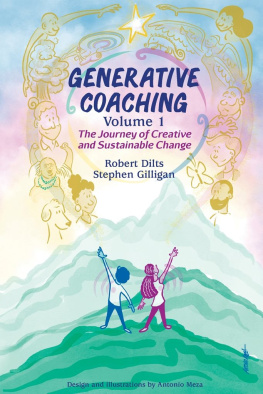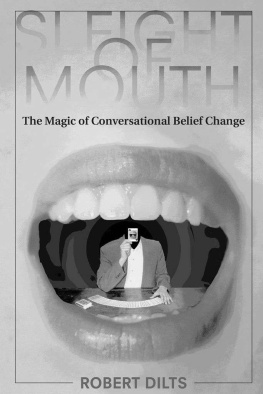Robert B. Dilts - Strategies of Genius: Volume I
Here you can read online Robert B. Dilts - Strategies of Genius: Volume I full text of the book (entire story) in english for free. Download pdf and epub, get meaning, cover and reviews about this ebook. year: 1994, publisher: Dilts Strategy Group, genre: Religion. Description of the work, (preface) as well as reviews are available. Best literature library LitArk.com created for fans of good reading and offers a wide selection of genres:
Romance novel
Science fiction
Adventure
Detective
Science
History
Home and family
Prose
Art
Politics
Computer
Non-fiction
Religion
Business
Children
Humor
Choose a favorite category and find really read worthwhile books. Enjoy immersion in the world of imagination, feel the emotions of the characters or learn something new for yourself, make an fascinating discovery.
- Book:Strategies of Genius: Volume I
- Author:
- Publisher:Dilts Strategy Group
- Genre:
- Year:1994
- Rating:4 / 5
- Favourites:Add to favourites
- Your mark:
- 80
- 1
- 2
- 3
- 4
- 5
Strategies of Genius: Volume I: summary, description and annotation
We offer to read an annotation, description, summary or preface (depends on what the author of the book "Strategies of Genius: Volume I" wrote himself). If you haven't found the necessary information about the book — write in the comments, we will try to find it.
Strategies of Genius: Volume I — read online for free the complete book (whole text) full work
Below is the text of the book, divided by pages. System saving the place of the last page read, allows you to conveniently read the book "Strategies of Genius: Volume I" online for free, without having to search again every time where you left off. Put a bookmark, and you can go to the page where you finished reading at any time.
Font size:
Interval:
Bookmark:
Strategies of Genius
Volume I
Aristotle
Sherlock Holmes
Walt Disney
Wolfgang Amadeus Mozart
by
Robert B. Dilts

Dilts Strategy Group
P.O. Box 67448
Scotts Valley, California 95067
Phone: +1 (831) 438-8314
E-Mail:
Homepage: http://www.diltsstrategygroup.com
Original artwork by Robert B. Dilts.
Copyright 1994 by Robert Dilts and Dilts Strategy Group.
Printed in the United States of America. All rights reserved.
This book or parts thereof may not be reproduced in any form without written permission of the Publisher.
Library of Congress Card Number 94-77-813
I.S.B.N. 978-1-947629-07-3
I.S.B.N. 978-1-947629-12-7 (e-book)
Contents
Dedication
To my coauthors of
Neuro-Linguistic Programming Volume I
- John Grinder, Richard Bandler,
Judith DeLozier and Leslie Lebeau
who participated in the birth of this vision and mission,
and to David Gordon, Todd Epstein, Gino Bonissone
and the many others who have shared the vision
with me since then.
Acknowledgments
I would like to acknowledge:
My parents Patricia and Robert who transferred to me their joy and interest in science, literature, art, music and the preciousness of life.
My brothers Mike, Dan and John and my sister Mary who shared with me the fascination and excitement of exploring this incredible and beautiful planet.
My wife Anita, and my children Andrew and Julia whose understanding and patience with me has been almost superhuman. There is no way I could have completed such a work without their support.
Todd and Teresa Epstein who have backed my creative efforts over the years, and published early versions of some of these strategies through Dynamic Learning Publications.
Michael Pollard and Ami Sattinger who labored with me as Realist and Critic to put these ideas into book form.
And all of the people over the years who have sent me material and supported me and encouraged me in my mission.
Preface
In the preface to Neuro-Linguistic Programming Volume I my coauthors and I attempted to define the scope and purpose of the field that we had participated in creating together. We pointed out that:
NLP could be described as an extension of linguistics, neurology, or psychology; separations that although may in fact be fictitious in nature are in fact expedient for human learning and the development of knowledge that is practical and impactful on our lives...[NLP is] not just useful models and patterns formalized from various activities, but an extension of how those patterns and models came into being, thus a field both informative and practical, but most significant...unique in its purpose and methodology.
We sought to identify a broad and challenging future for the field as a cognitive science, and expressed our belief that, through NLP, ...learning and experiences from entirely divergent fields have the opportunity to combine knowledge and experience into configurations that allow further growth, understanding and impact upon ourselves as a species.
In the book, we defined a system of distinctions and a methodology for studying the structure of subjective experience. We identified a set of tools that could be used to discover and describe the mental programming of an individual in the form of cognitive strategies. The book covered principles of elicitation, utilization, design and installation of such strategies. As illustrations of these principles, we suggested some ways in which this new technology of the mind could be applied to the areas of health, learning, business management and psychotherapy.
In the conclusion to Neuro-Linguistic Programming Volume I, we promised:
...the next book in the series, Neuro-Linguistic Programming Volume II, in which we will apply the model that has been developed here to present and analyze the strategies that we have found to be the most effective and well-formed for achieving the outcomes for which they were created. In Volume II we will present the strategies that have proven to be the most efficient and elegant for achieving successful results in areas and disciplines, ranging from learning physics, to playing chess, to making decisions, to learning to play a musical instrument, to creating entirely new models of the world for yourself. In the second volume we will also explore more specifically how to apply Neuro-Linguistic Programming to your work and everyday life.
For a number of reasons we were unable to follow through with this commitment. But that pledge and the vision behind it has stayed with me these many years since NLP Volume I was first conceived and written. In many ways, this series on the Strategies of Genius is intended to be the fulfillment of that promise of an NLP Volume II.
On another level, this work is the fulfillment of a vision that began almost twenty years ago, a full five years before the publishing of NLP Volume I. In a class at the University of California at Santa Cruz, called Pragmatics of Human Communication, I had a conversation with John Grinder about the possibility of mapping the sequences in which exceptional people unconsciously employed their senses while they were thinking. I was at that time a junior in college and John Grinder was a professor of linguistics.
The discussion planted a seed in me about a larger study of the cognitive patterns of well known geniuses, that would on the one hand honor their brilliance, and at the same time demystify it and make it have more practical applications. Part of the idea was that these strategies could be coded into basic yet simple enough elements that aspects of them could even be taught to children in preparation for challenges they would face in their adult lives.
That seed was to grow into this work on the Strategies of Genius.
This book is the first volume of Strategies of Genius. In it I will explore the cognitive processes of four very different but important individuals who have contributed in a positive way to our modern world; Aristotle, Sherlock Holmes, Walt Disney and Wolfgang Amadeus Mozart. The behavioral areas in which all of these individuals operated were quite different from one another, and one of them is actually a character from fiction. However they all have something in common: unique and powerful strategies for analyzing and problem solving or creating, which continue to fascinate and entertain us to this day.
Volume II of this work is entirely devoted to Albert Einstein. The mere scope and magnitude of Einsteins contributions to our perceptions of ourselves and our universe warrants an entire volume.
Future volumes will include studies of Leonardo da Vinci, Sigmund Freud, John Stewart Mill, Nicola Tesla and some more recent geniuses such as Gregory Bateson, Moshe Feldenkrais and Milton H. Erickson, M.D.
The choice of the individuals studied in this work did not come out of any deliberate plan. Rather they were people who had sparked or inspired something in me personally or seemed to represent something deeply fundamental. Often, key material used for analysis was serendipitously given to me by someone who knew I was interested in a certain individual or was researching the strategies of geniuses. The project unfolded organically in a way similar to the processes used by these geniuses themselves.
Next pageFont size:
Interval:
Bookmark:
Similar books «Strategies of Genius: Volume I»
Look at similar books to Strategies of Genius: Volume I. We have selected literature similar in name and meaning in the hope of providing readers with more options to find new, interesting, not yet read works.
Discussion, reviews of the book Strategies of Genius: Volume I and just readers' own opinions. Leave your comments, write what you think about the work, its meaning or the main characters. Specify what exactly you liked and what you didn't like, and why you think so.









